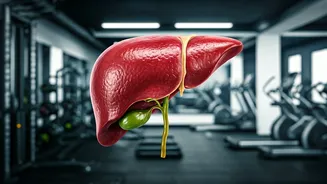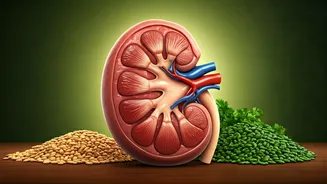Understanding Fatty Liver
Fatty Liver Disease, or NAFLD, is a condition where excess fat accumulates in the liver. It's becoming increasingly common, linked to factors like obesity,
diabetes, and unhealthy lifestyles. NAFLD can range from a mild condition to a more serious one, like nonalcoholic steatohepatitis (NASH), which involves inflammation and liver damage. If not addressed, this can lead to cirrhosis or liver failure. Early detection and lifestyle changes, including diet and exercise, are crucial for managing NAFLD. The goal is to reduce liver fat and inflammation, improving overall liver health and function. Regular medical check-ups and a proactive approach to health are key to preventing the progression of this disease. By understanding the causes and stages of NAFLD, individuals can take informed steps toward better liver health.
Exercise's Healing Role
Exercise plays a pivotal role in combating Fatty Liver Disease. Physical activity helps reduce liver fat by improving insulin sensitivity and promoting fat burning. This can also reduce inflammation, a critical component of NAFLD progression. Regular exercise improves overall metabolic health, reducing the risk of complications like diabetes and heart disease. Aerobic exercises, like brisk walking, running, and cycling, are particularly effective. Strength training also helps as it increases muscle mass, further improving insulin sensitivity. Aim for at least 150 minutes of moderate-intensity exercise or 75 minutes of vigorous-intensity exercise each week. Combining aerobic and strength training can provide the best results. Consulting a healthcare professional or a certified trainer can help you create a personalized exercise plan that fits your needs and health status.
Types of Workouts
Various types of exercise are beneficial for managing Fatty Liver Disease. Aerobic exercises, such as jogging or swimming, are excellent for burning calories and reducing liver fat. Aim for at least 30 minutes of moderate-intensity cardio most days of the week. Strength training, including weightlifting or bodyweight exercises, is equally important. Building muscle mass improves insulin sensitivity and helps the body process glucose more efficiently. Aim to incorporate strength training sessions at least twice a week. High-intensity interval training (HIIT) is another effective option. HIIT involves short bursts of intense exercise followed by brief recovery periods. These workouts can be highly effective for burning fat and improving cardiovascular health in a short amount of time. Always warm up before exercising and cool down afterward. Listening to your body and consulting with a healthcare professional can ensure you choose the best and safest exercise routine for your specific needs.
Integrating into Routine
Incorporating exercise into your daily routine is key to seeing the benefits. Start by setting realistic goals and gradually increasing the intensity and duration of your workouts. Find activities that you enjoy, such as dancing, hiking, or team sports, to stay motivated. Schedule exercise sessions like appointments in your calendar, ensuring you prioritize physical activity. Make exercise a social activity by working out with friends or family, which can make it more enjoyable and help you stay committed. Consider using fitness trackers or apps to monitor your progress and stay motivated. Mix up your workouts to keep things interesting and prevent boredom. Even small changes, like taking the stairs instead of the elevator or walking during your lunch break, can make a difference. Consistency is more important than intensity. Over time, regular exercise becomes a habit that supports your liver health and overall well-being.
Complementary Lifestyle Changes
Alongside exercise, other lifestyle changes enhance the benefits of physical activity for NAFLD. A balanced diet is critical. Focus on whole foods, including fruits, vegetables, lean proteins, and whole grains, while limiting processed foods, sugary drinks, and saturated fats. Maintaining a healthy weight is vital. Excess weight can worsen liver fat accumulation, so aim for a gradual weight loss through diet and exercise. Limit alcohol consumption or avoid it altogether. Alcohol can worsen liver damage. Stay hydrated by drinking plenty of water throughout the day. Manage other health conditions, such as diabetes and high cholesterol, as they can impact liver health. Consult with a healthcare professional for personalized advice on managing these conditions. Regular medical check-ups are essential. Monitor your liver health and adjust your lifestyle as needed to achieve optimal health outcomes.












